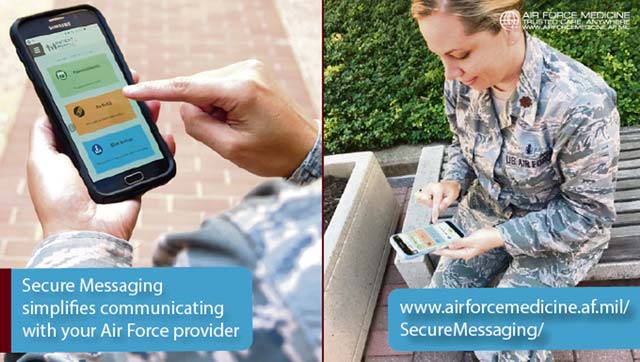
FALLS CHURCH, Virginia — In today’s connected world, we expect most communication to be convenient and instantaneous. Why should communicating with your health provider be any different? That is why the Air Force Medical Service offers a secure messaging platform for patients and families to communicate safely and quickly with their providers.
The TRICARE Online Patient Portal Secure Messaging, or just Secure Messaging, can be especially valuable for patients using a specialty provider. Patients visit their primary care provider for regular visits and preventive care, but specialist visits are rarer and often occur under stressful circumstances. The benefits of Secure Messaging can make a big difference for these patients.
Lt. Col. (Dr.) Daniel Schulteis, a developmental behavioral pediatrician with the 88th Medical Group at Wright-Patterson Air Force Base in Ohio, is an enthusiastic advocate for secure messaging in his practice.
“I could not function in my clinic and serve my whole patient population without secure messaging,” Schulteis said. “It’s absolutely critical to what I do and to how my team functions.”
Schulteis’ practice makes full use of Secure Messaging to communicate with patients, share documents, complete reports and even in-process patients to the clinic. All this is on families’ own schedule, without the need for extra visits or phone calls.
“The first thing my team does for new patients is enroll them in Secure Messaging,” Schulteis said. “We use it for our intake packet, patient questionnaires, screening information, family history and more. Getting all that up front improves the care when the patient is actually in the clinic. I don’t waste time getting all that background material in person. I feel like I know the patient before I meet them.”
The patients and families in Schulteis’ clinic usually face high stress levels. Developmental and behavioral childhood disorders can take a high toll on resilience. Anything that removes a burden from a family improves their quality of life.
“We don’t have to play phone tag or find a way around work schedules to get information from parents,” Schulteis said. “They can sit down after the kids are in bed and send us a message on their own time.”
Medical care for children with developmental and behavioral disorders involves a lot of paperwork. Schulteis’ clinic receives progress reports and input from many sources, including teachers, guidance counselors and other medical providers. Receiving all these documents electronically over Secure Messaging makes it much easier for parents and clinic staff to organize and share the information.
“Secure Messaging is fundamental to what I do,” Schulteis said. “There’s no way I could take care of my patients without it. Some families are hesitant to start using it, but once they see what a difference it can make and how fast we respond, they come around.”
To learn more about Air Force Secure Messaging at Air Force or to sign up, visit www.airforcemedicine.af.mil/TOLPatientPortalSecureMessaging/.


